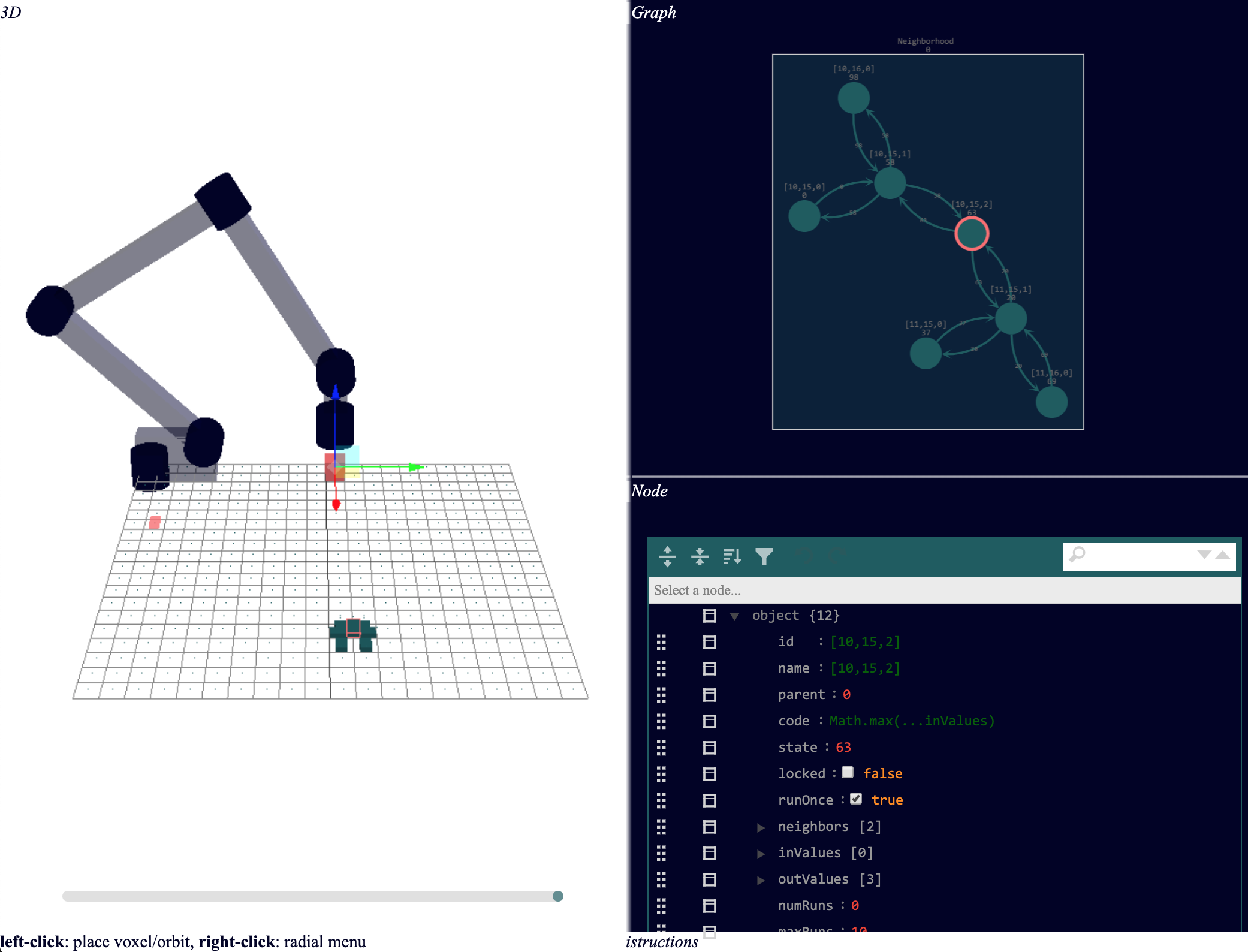Physical Computing Design Tools
Description
Repository for DICE design tools explorations.
Topics include:
- Programming strategies for spacial computing
- Data flow programming and Distributed Deep Neural Networks
- Physics Simulation
- Trusted Systems
- Reconfiguration strategies for DICE pieces
- CAM tools and path planing:
- Desktop (external) assembler
- Swarm assembly and manipulation
- CAM tools and path planing:
Demo Links
- "Physical Computing Interface" demo lives here.
- "Performance Calculation Graph" demo lives here.
- Distributed Deep Neural Networks
- UR10 voxel Assembly demo.
Progress
Hardware Architecture Inference
Probabilistic Programming
- Gamalon
- Using Dice pieces to do inference
- in order to find the best configuration based on its performance
- other tasks
- WebPPL: probabilistic programming for the web
- Probabilistic Graphical Models
In order to map the hardware architecture to an input dataflow program or computation graph, I modeled the hardware and software models as probabilistic graphical model, and used probabilistic programming to infer the best hardware architecture choices that will optimize the speed, energy and cost of the system.
I used WebPPL a probabilistic programming language in javascript. I model the variables I want to infer as if they come from different types of distributions that integrate our priors in them. In the following example I am using markov chain monte carlo as an inference method.
The structure of the probabilistic program looks like this:
var model=function (){
var chipType=function () { return uniformDraw(["STM32F412","samd51j19","samd51j20","MAX32660","STM32F412","XMEGA"])};
var chip=processors.type[chipType()];
//display(chip.name);
var ram=chip.ram;
var cyclesPerSecond =chip.cyclesPerSecond;
var bitsPerSecond =chip.bitsPerSecond ;
var costPerChip =chip.costPerChip ;
var flopsPerWatt =chip.flopsPerWatt ;
var interconnect=mem(function (model) { return uniformDraw([2,4,6])});
var nodesNumber= mem(function (model) { return uniformDraw([10,20,30,40,50])});
var dataExchangeSize=mem(function (model) {return gaussian(1e3, 10)});
var memoryPerComputation=mem(function (model) {return gaussian(10e3, 10)});
var numberofComputations=mem(function (model) {return gaussian(200, 10)}); //nodes of similar computations
var computation = mem(function (model) {return gaussian(100, 20)});
var maxNumberOfInterconnects= mem(function (model) {return gaussian(10, 2)});
doCalculation();
var speed=computationTime+communicationTime; //frame
var cost=nodesNumber("DICE")*costPerChip;
var energy= 1 / flopsPerWatt*numberofNodesNeeded*computationTime;//per frame
condition(speed<0.0012 && cost<180);
// return [speed,cost,energy]
if(result==1){
return chip.name;
}else if(result==2){
return interconnect("DICE");
}else{
return nodesNumber("DICE");
}
}
var result=3;
var options = {method: 'MCMC', kernel: 'MH', samples: 10000}
var dist = Infer(options, model)
viz(dist)
display('Expected nodesNumber: ' + expectation(dist))
expectation(dist)Until now I have a dummy computation model. Next steps would be to get a complex computational graph and for each part infer the best hardware architecture for it. Moreover, if the computation graph changes through time one can also alter the hardware architecture to respond to these changes.
Applications
- The idea is to find an application that needs reconfiguration white running, examples:
- Gamalon probabilistic programming
- more computing power while assembling voxels
- Neural Networks?
Voxel Simulation
Capabilities and Updates
- Design
- Parametric grid definition (cubic, hexagonal, dice)
- Assembly/timeline
- Timeline for future morphing computing
- UR10
- Graph
- Hierarchy
- Automatic neighborhood
- highlights
- Computing
- Asynchronous code propagation (distributed max example)
- Simple test case find max value distributed
- Min cut max flow concept study neighborhood
- Improved UI and integration
- Radial menu
- Json propagation
- Highlight selected node
Desired Milestones
-
Assembly
- Swarm construction
-
Computation
- Morphing code
- Real simulation/message passing analysis
-
Computation Optimization
- Restructuring code and automatically divide into distributed
- show alternatives and bottlenecks
- Auto compilation/export to dice modules
- Simulation portal
-
Case Studies
- Neural networks
- Bayesian optimization
- Distributed optimization
- Voxel design
-
Scaling
- stress testing scaling
TODOS:
- Grid Systems
-
Documentation
- in depth documentation of how to do everything
- Reset Grid/button
-
Assembly
- fix errors
-
Add real Dice info
- computation delay and communaction cost
- CAD?
-
Select
- improve selected visualization
- when selecting group show bounding box
-
Hierarchy
- place multiple voxels
- change code of mutiple voxels
- select multiple dice pieces
- create groups

